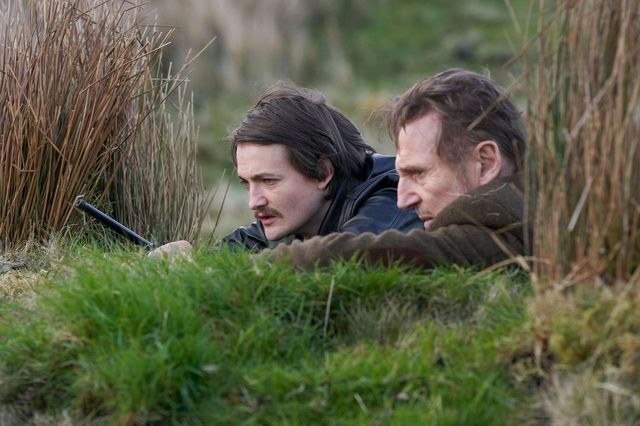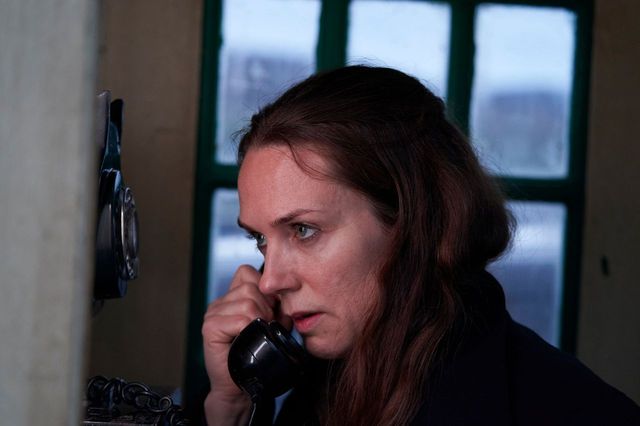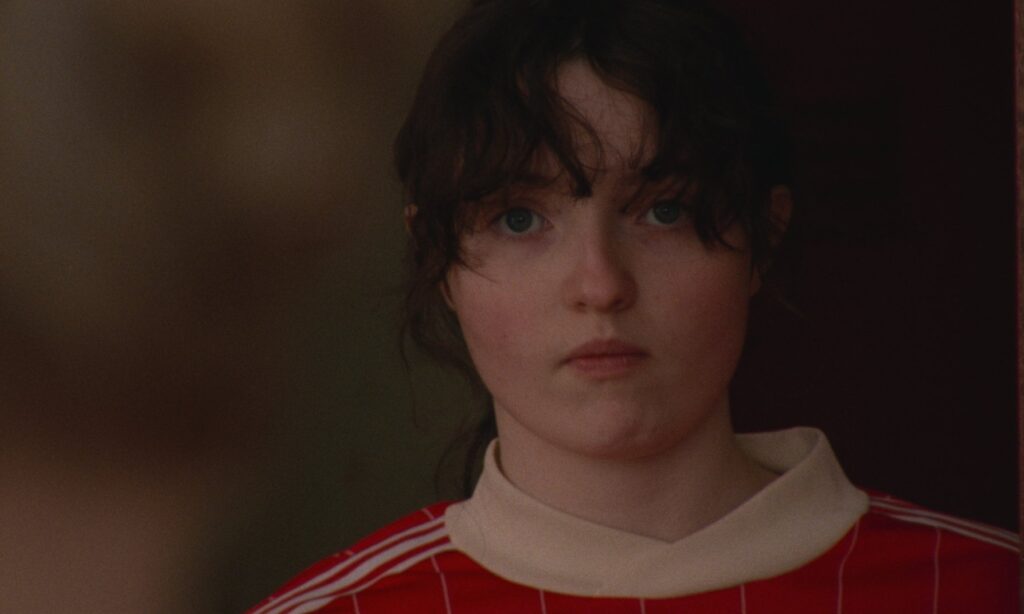March 30, 2024
by Carla Hay

“In the Land of Saints and Sinners”
Directed by Robert Lorenz
Culture Representation: Taking place in Northern Ireland, the dramatic film “In the Land of Saints and Sinners” features a predominantly white group of people (with one black person) representing the working-class, middle-class and criminal underground.
Culture Clash: A seemingly mild-mannered book dealer in a small town is really undercover, with a mission to kill terrorists from the Irish Republican Army (IRA).
Culture Audience: “In the Land of Saints and Sinners” will appeal primarily to people who are interested in movies about the IRA and are fans of star Liam Neeson and the crime dramas that he has been churning out on a regular basis.

“In the Land of Saints and Sinners” is exactly the type of movie that it appears to be. Just like almost every Liam Neeson movie with gun shootouts and other violence, this crime drama (which takes place in 1974 Northern Ireland) is very predictable. The talented cast’s credible performances elevate the formulaic story. Although it’s not a very original story, “In the Land of Saints and Sinners” is at least a straightforward and uncomplicated film that should satisfy people who are inclined to like this type of movie.
Directed by Robert Lorenz, “In the Land of Saints and Sinners” was written by Mark Michael McNally and Terry Loane. The movie had its world premiere at the 2023 Venice International Film Festival. At this point in Neeson’s career, he has been in “shuffle and repeat” mode in his movies, by playing the same type of character, but with different names and locations. Neeson’s typecast role is a brooding loner with a “particular set of skills” from a shady past, and he’s usually on a mission as a vigilante, agent, assassin or other “fill-in-the blank” gun-toter, who’s undercover or has gone rogue.
In “The Land of Saints and Sinners,” Neeson has the role of Finbar Murphy, a widower who seems to be a mild-mannered book dealer in the rural coastal town of Glencolmcille, Northern, Ireland. At home (where Finbar’s only companion is a cat), when Finbar is not puttering around his garden, he’s mildly flirting with his friendly widow neighbor Rita (played by Niamh Cusack) or having amiable chats with a local garda named Vincent O’Shea (played by Ciarán Hinds), who sometimes stops by for visits. Finbar and Vincent also hang out at a local pub, where they strike up an acquaintance with an African immigrant named Hasan Bello (played by Valentine Olukoga), a fiddler who is often part of the pub’s entertainment.
But trouble comes to Glencolmcille in the form of violent terrorists from the Irish Republican Army (IRA), which is fighting for Northern Ireland to be independent from the United Kingdom. Some of these IRA terrorists are hiding out in Glencolmcille, after setting off a car bomb in Belfast. This bombing (which is shown in the beginning of the movie), killed six people, including three children.
The leader of these fugitive terrorists is Doireann McCann (played by Kerry Condon), a callous and scheming manipulator, who’s not afraid of engaging in the same brutal violence that she expects her subordinates to inflict. The other people in Doireann’s crew are loyal henchmen Curtis June (played by Desmond Eastwood), quick-tempered Conan McGrath (played by Conor MacNeill) and hulking brute Séamus McKenna (played by Seamus O’Hara), who are all farly generic characters in a movie like this one. Condon is compelling to watch as the ruthless Doireann, who is volatile enough to make this movie’s viewers curious to see what she will do next.
“In the Land of Saints and Sinners” reveals very early on in the movie that Finbar is not as mild-mannered and squeaky-clean as he would like to appear to the community. There’s a scene showing that Finbar has kidnapped an unnamed official (played by Tim Landers), who is being held in the trunk of a car. Finbar drives the car to remote area, forces the man to dig his own grave, and then shoots the man.
Later, Finbar gets paid by cash in an envelope given to him by a local police officer named Robert McQue (played by Colm Meaney), who obviously hired Finbar to commit this murder. Finbar’s motives for becoming an assassin are murky for most of the film, but it’s pretty clear that he’s gotten involved in corrupt government dealings. In other words, Finbar is a typical Neeson movie character with gray areas of morality and ethics.
But just like a typical Neeson movie character, Finbar isn’t completely hardened and has a “softer side” to him. After he gets paid by Robert, Finbar says to Robert: “There’s more to me than this. I’d like folks to see it. I could plant a garden.” Finbar adds. “Are you going to miss me?” Robert replies, “Like a hole in the head.”
Finbar shows he has a “tough but tender” heart when he befriends a local girl named Moya (played by Michelle Gleeson), who is about 8 or 9 years old and is being physically abused by her domineering single father. In addition, Finbar develops a mentor-like relationship with a local young man named Kevin Lynch (played by Jack Gleeson, no relation to Michelle Gleeson), who is restless and bored in Glencolmcille and is looking for some action. Finbar’s paternal approach to Moya and Kevin are Finbar’s way of trying the ease Finbar’s feelings of guilt of his own failings as a father.
“In the Land of Saints and Sinners” (which has very good cinematography from Tom Stern) sometimes lumbers along at a sluggish pace, but the movie has an engaging authenticity with the dialogue and characters—unlike most of Neeson’s action films that have nonsensical plots and ridiculous characters who say and do stupid things. Because “In the Land of Saints and Sinners” reveals early on that Finbar is undercover with a false identity, there’s no mystery about what his intentions are and what he will do in the inevitable showdown between Finbar and the terrorists. There isn’t a bad performance in the movie, but “In the Land of Saints and Sinners” is the type of film where you know how it’s going to end within the first 15 minutes after the movie begins.
Samuel Goldwyn Films released “In the Land of Saints and Sinners” in U.S. cinemas on March 29, 2024.


